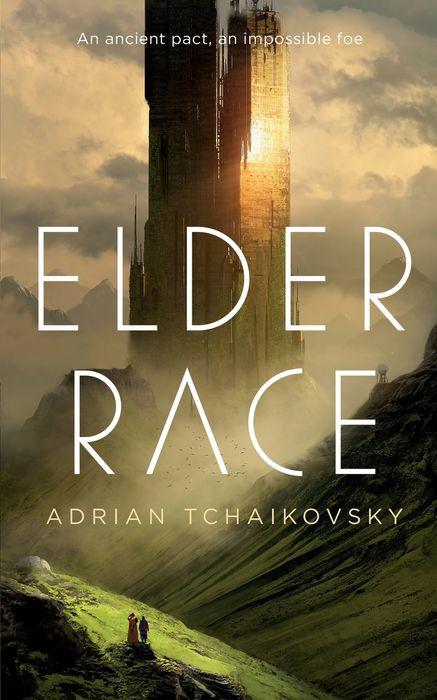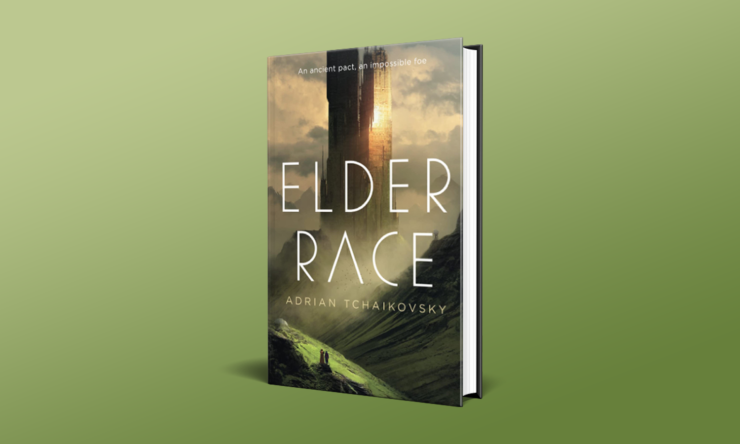There’s something inherently intriguing about a narrative that seems to be one genre and then turns out to be another—especially when it’s a work of fantasy that turns out to be a work of science fiction. There’s Arthur C. Clarke’s famous quote, “Any sufficiently advanced technology is indistinguishable from magic.” Arkady and Boris Strugatsky’s Hard to Be a God, Samuel R. Delany’s The Einstein Intersection, and Iain M. Banks’s Inversions would all fall into this category as well.
At the very beginning of Elder Race, Adrian Tchaikovsky cites Gene Wolfe’s short story “Trip, Trap”—which filters the same narrative through the perspective of two characters, one science fictional and one fantastical—as “a major inspiration for this book.” And on the surface, the two central characters of Elder Race offer a similar tandem: There’s Lynesse, who reads very much like the archetypal protagonist of a fantasy story, and Nyr, who occupies a very different role in the narrative than Lynesse believes that he does.
The initial premise? Lynesse Fourth Daughter is the largely-ignored child of a monarch, looking for a suitably heroic deed to accomplish, who goes off to enlist the help of a long-lived wizard who aided one of her ancestors. A mysterious threat plagues the land, and the elusive Nyrgoth Elder is the only one who might have the answers. By the opening sentences of the second chapter, though, the reader has a sense of what to expect: “My name is Nyr Illim Tevitch, anthropologist second class of Earth’s Explorer Corps. I am centuries old and light years from home.” It’s a swerve, all right—but it doesn’t quite swerve in the expected direction.
It would be easy for this book to have gone the full deconstruction route. Tchaikovsky’s novella One Day This Will All Be Yours went that route when it came to time travel tropes, but also took its narrator to a few interesting psychological places, exploring the full ramifications of someone defending their own corner of time at all costs. Here, what Tchaikovsky does that’s especially notable is to fully explore the idea of two characters who each see the world in a different way—and whose use of language doesn’t quite line up.
Buy the Book


Elder Race
Sophos 4, where Elder Race is set, was colonized by Earth over a thousand years ago. Nyr’s own expedition there took place long after a society had been established there—albeit one that had reverted back to a more or less medieval state of existence. Nyr has also spent years in a state of suspended animation, and has certain cybernetic modifications—notably the Dissociative Cognition System, designed to “cut [him] off from certain aspects of my own biochemistry.”
There’s also a running bit about Nyr’s translations into “the local dialect” being “a little fancier” than I intended. Which means that when he intends to say “Why are you here?” Lynesse hears “For what purpose do you disturb the Elder?”
Told via alternating chapters from the perspectives of Lynesse and Nyr, the novel’s full scope becomes clear via a conversation that we see from both characters’ perspectives. “There is a beast that has hounded me down the centuries,” Nyr tells Lynesse. “It is always at my back, and sometimes it grows bold and its teeth are at my throat.” Perfectly understandable in the context of a fantasy narrative, right? An ancient wizard requires a balrog, and so on. But when we turn to Nyr’s own perspective on this scene, something shifts.
“And so she wanted to know why I looked sad, and I explained it was basically a long-term mental state and it was all under control, but that didn’t seem to be what she heard. And of course they don’t have a precise word for ‘clinical depression’ or anything like that.”
The allusions throughout to Nyr’s struggles with depression ultimately deepen the narrative and take it to a few unexpected places. And while some encounters are played for laughs—such as when Lynesse perceives a demon when Nyr summons a centuries-old drone—the growing bond between the two of them is not.
Gradually, the threat that the two face evolves into a genuine mystery. Lynesse describes it early in the novel as “a demon who steals minds,” and Nyr spends a not insubstantial part of the book trying to figure out just what this could be, and what science fictional concept might be capable of the effects that certain characters describe to them.
And by the time Elder Race reaches its conclusion, it does so in a unexpectedly moving fashion. This could have been a trifle, what Graham Greene described as “entertainments.” Instead, in showing the emotions at the heart of two characters who could have easily felt like stock types and putting each to the test, Elder Race completes the swerve and arrives at its destination with a renewed sense of purpose—and a refreshing lack of irony.
Elder Race is available from Tordotcom Publishing.
 Tobias Carroll is the managing editor of Vol.1 Brooklyn. He is the author of the short story collection Transitory (Civil Coping Mechanisms) and the novel Reel (Rare Bird Books).
Tobias Carroll is the managing editor of Vol.1 Brooklyn. He is the author of the short story collection Transitory (Civil Coping Mechanisms) and the novel Reel (Rare Bird Books).










